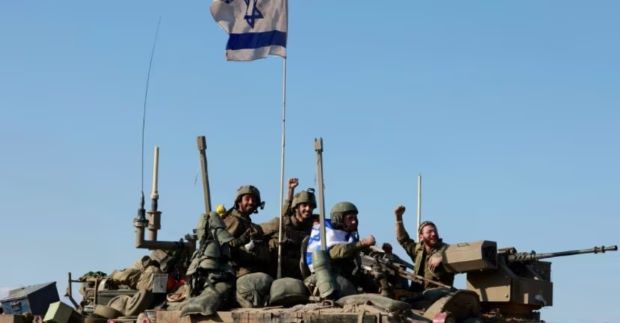Israel pounds Gaza as fears grow of widening war
By Adel Zaanoun with Chloe Rouveyrolles-Bazire in Jerusalem
PALESTINIAN TERRITORIES – Israel pummelled southern Gaza on Tuesday (16), after announcing the winding down of the intense phase of the war that has inflamed tensions across the Middle East.
Israeli Prime Minister Benjamin Netanyahu’s government has come under mounting international pressure to end its offensive in Gaza launched in response to Hamas’ unprecedented October 7 attacks.
But fears are mounting the war could escalate, with Iran and its proxies stepping up attacks across the region in solidarity with Hamas, the Islamist movement that rules the Palestinian territory.
Hamas’s press office said Israeli strikes killed at least 78 people in the Gaza Strip overnight. An AFP correspondent said the southern city of Khan Yunis was hit hard.
A young girl scoured rubble for salvageable items, while some scrambled to reach safer areas in Rafah on the Egyptian border, their belongings piled onto carts drawn by donkeys and tractors.
In central Gaza’s devastated Al-Maghazi refugee camp, one woman raised her hands and cried out amid the wreckage of warped metal, gutted buildings and overturned vehicles.
A barrage of 50 rockets was fired toward Netivot in southern Israel, without causing any casualties, the army said. Hamas’ armed wing, the Ezzedine al-Qassam Brigades, claimed the attack.
AFPTV live footage showed trails of smoke and explosions ring out as Israeli air defences intercepted rockets near Gaza.
– ‘Tamp down flames’ –
Fighting has ravaged Gaza since October 7, when Hamas militants carried out an unparalleled attack on Israel that resulted in about 1,140 deaths, mostly civilians, according to an AFP tally based on official Israeli figures.
Militants also dragged about 250 hostages back to Gaza, 132 of whom Israel says remain there, including at least 25 believed to have been killed.
At least 24,285 Palestinians, about 70% of them women, children and adolescents, have been killed in Gaza in Israeli bombardments and ground operations since October 7, according to the Hamas government.
Israel has concentrated operations on Khan Yunis since announcing on January 6 that it had dismantled Hamas’s military structures in the north.
Israeli Defence Minister Yoav Gallant on Monday (15) said intense operations would “soon” wind down in the territory’s south.
The army announced Tuesday the death of two more soldiers in Gaza, bringing to 190 the total number killed since its ground invasion began.
UN chief Antonio Guterres on Monday reiterated calls to stop the bomging and facilitate delivering aid, releasing the hostages and “tamp down the flames of wider war”.
But Israeli officials have repeatedly warned the fighting will continue for months.
– Yemen ship attack –
Violence involving regional allies of Iran-backed Hamas – considered a terrorist group by the United States and the European Union – has surged since the war began.
Yemen’s Huthi rebels, who say their repeated attacks on Red Sea shipping are in solidarity with Gaza, claimed a missile strike on a US-owned cargo ship on Monday.
It came just days after the United States and Britain bombed scores of targets inside Huthi-controlled Yemen in response to their operations.
In another such attack, a missile struck a Greek-owned cargo ship in the Red Sea off Yemen, maritime risk management company Ambrey said on Tuesday.
The US military said it had seized Iranian-made missile parts that were en route to the Huthis on a boat in the Arabian Sea.
Iran’s Islamic Revolutionary Guard Corps said it carried out an overnight missile attack that destroyed an Israeli spy headquarters in Iraq’s Kurdistan region.
The Guards said they also struck a “gathering of anti-Iranian terrorist groups” in the Iraqi Kurdistan capital Arbil and hit Islamic State group sites in Syria.
Iraq condemned the strikes as an “attack on its sovereignty”.
It dismissed Iran’s claim it had hit an Israeli intelligence base, saying it struck a businessman’s house and he was among four people killed.
On Tuesday, Israel’s army said it conducted air and artillery strikes on Hezbollah, Lebanon’s powerful Iran-backed Shiite movement that has exchanged regular cross-border fire with Israeli forces since the war started.
“We are already in a regional war… even though it’s still at a low simmer,” said Ali Vaez, director of the Iran Project at the International Crisis Group.
– ‘Death is better’ –
The UN says the Israel-Hamas war has displaced roughly 85% of Gaza’s 2.4 million people, many of whom have been forced to crowd into shelters and struggle to get food, water, fuel and medical care.
As temperatures plunge, families living in makeshift tents in the southern city of Rafah have resorted to burning plastic to ward off the chill, despite the noxious fumes.
“I pray every day that we will all be martyred. Death is better than this life,” said Abdul Karim Muhammad, a 29-year-old father of three whose family fled to Rafah from Jabalia refugee camp in northern Gaza.
The Israeli public has kept up pressure on the government to secure the return of the hostages seized by Hamas, which on Monday announced the deaths of two more captives.
The Al-Qassam Brigades released a video showing a woman hostage, speaking under duress, revealing that two men she was held with had been killed in captivity. It blamed the Israeli bombing for their deaths.
Army spokesman Daniel Hagari rejected the cause of death as a “lie” but added that Israel “hit targets near the location where they were held”, saying an investigation was underway.
At an event in Berlin, Hagit Chen said it was “hard to live, to sleep, to breathe, to eat” because she had heard nothing from her son Itay, 19 since Hamas kidnapped him.
-Agence France-Presse



Comments are closed, but trackbacks and pingbacks are open.